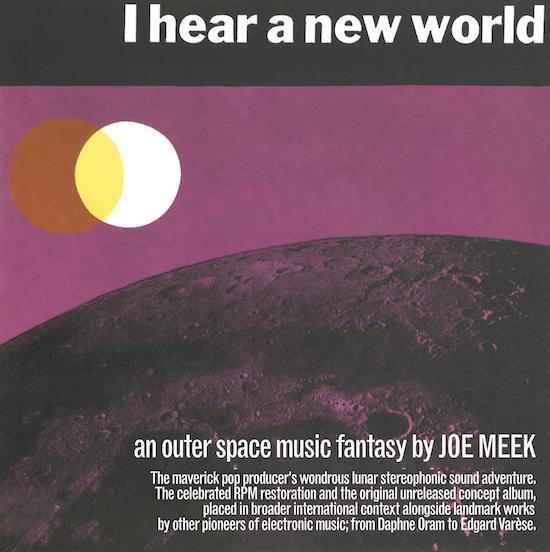Today there are almost as many histories of electronic music on the market – and compilation albums celebrating those histories – as there are commercial synthesizers. Cherry Red’s new compilation, I Hear A New World, takes us back to a time when there were neither, a time when electronic sounds were handmade, bit by bit, when electronic music meant jury-rigged contraptions flying against their manufacturers’ instructions, and when the idea of making music directly from electricity remained very much in the epilogue marked ‘possibilities for the future’ in the published histories of music. It was a time when studio engineers turned up to work in a suit and tie, when pop producers and classical composers gazed at each other across a gaping chasm with a peculiar mixture of envy and incomprehension.
But ‘electronic music’ has always been a deeply nebulous term, almost impossible to date or define. So how you choose to tell that story – and where you choose to begin it – is important, it says something about the kind of electronic music you have in mind, your vision of its world. And Cherry Red, here, start with Joe Meek – specifically the 1959 bedroom utopia which gives its name to the whole album. And from there they progress, as if quite naturally, through the BBC Radiophonic Workshop and the solo work of Daphne Oram, to Hugh LeCaine and Tom Dissevelt, to Edgard Varèse and Olivier Messiaen, Ligeti’s ‘Artikulation’ and Pousseur’s ‘Scambi’. Much of the music itself may be familiar, but the story they tell, so framed, is less so.
Listening to Meek’s I Hear A New World again, both the familiar restored version from 1991 and its original white label from 1960 (each of which are included on this compilation) remains a dizzying experience. In its own time, it must have come across as a bizarre hybrid of surf instrumentals and SF film soundtracks like Forbidden Planet and The Day The Earth Stood Still, of novelty records like Sparky’s Magic Piano, Pinky & Perky or Buchanan & Goodman’s ‘Flying Saucer’ and the sort of stereo demonstration discs put out by the likes of Phase 4 or Perfect Presence Sound. But with hindsight, it seems to glimmer with the future possibility of The Beatles’ psychedelic experiments, with the howling susurrus of Hendrix’s guitar, the wide-eyed sound fx of space-age disco, the post-rock of Bark Psychosis, Stereolab and Broadcast, the wonky alt-pop of Animal Collective and Ariel Pink.
It also feels weirdly inevitable. If we take seriously the proposition put forward by Agnès Gayraud in her Dialectic of Pop that pop music is fundamentally a recorded music – and a music about recording – then Meek’s highly reflexive use of the recording apparatus comes across as a strange fulfilment or inexorable result.
In David Stubbs’ brilliant Mars by 1980, Meek is presented as the “herald” of the 1960s, “among the first to grasp the potential of what would later become a truism – the studio as musical instrument.” It may seem absurd to think of Meek as a forerunner to the work of Pierre Henry or Bruno Maderna. But – like Stubbs’s book – the story told by this compilation is about listeners more than composers. For an audience weaned on the tea dance pop of the 40s and 50s, the work of Meek, Daphne Oram, Maddalena Fagandini, and Delia Derbyshire opened a door through the aperture of which it became possible to see electronic music as not just so much noise and lab-coated obscurity, but a pathway to the future.


